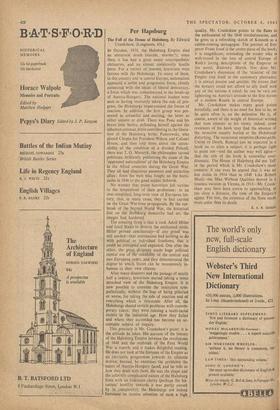Per Hapsburg
The Fall of the House of Habsburg. By Edward Crankshaw. (Longmans, 45s.) IN October, 1918, the Habsburg Empire died an unnatural death (suicide, murder?); since then, it has had a great many unsympathetic obituaries, and an almost consistently hostile press. For a variety of reasons, historians were furious with the Habsburgs. To many of them, in this country and in central Europe, nationalism appeared a noble and progressive force, closely connected with the ideals of liberal democracy, a force which was consummated in the break-up of Austria-Hungary. The national leaders were seen as having resolutely taken the side of pro- gress, the Habsburgs impersonated the forces of reaction. In addition, the first group was pre- sented as colourful and exciting, the latter as either sinister or drab. There was Pasic and his brave little Serbia, defending herself against the inhuman colossus, while contributing to the libera- tion of the Habsburg Serbs; Paderewski, who played Chopin for President Wilson and Colonel House, and then told them, about the unten- ability of the condition of a divided Poland; there was T. G. Masaryk, the philosopher turned politician, brilliantly publicising the cause of the 'oppressed nationalities' of the Habsburg Empire' in the Allied countries during the Great War. They all had illustrious ancestors and attractive allies: from the men who fought on the barri- cades in 1848 to the good soldier Schweik.
No wonder that many historians fell victims to the temptations of their profession: to an over-simplified, long-term view of European his- tory; that, in many cases, they in fact carried on the Great War-time propaganda. By the out- break of the Second World War, the historical line on the Habsburg monarchy had set, the images had hardened.
The amazing thing is that it took Adolf Hitler and Josef Stalin to destroy the enchanted circle. Hitler proved conclusively—if any proof was still needed—that nationalism had nothing to do with political or individual freedoms, that it could be corrupted and exploited. One after the other, the great, dictators made huge political capital out of the instability of the central and east European order, and they demonstrated the degree/to which States can be monstrously in- human to their own citizens.
After many disasters and the passage of nearly half a century, historians started taking a more detached view of the Habsburg Empire. It is now possible to examine the institution sym- pathetically, without the fear of being pilloried or worse, for taking the side of reaction and of everything which is detestable. After all, the Habsburgs shared certain problems with contem- porary rulers: they were running a multi-racial society in the industrial age. How they failed and where they succeeded has become an ac- ceptable subject of inquiry.
This precisely is Mr. Crankshaw's point; it is the attitude he takes. His account of the history of the Habsburg Empire between the revolutions of 1848 and the outbreak of the First World War is superb, and it makes delightful reading. He does not look at the fortunes of the Empire as an inevitable progression towards its ultimate demise. Instead, he examines the problems the rulers of Austria-Hungary, raced, and he tells us how they dealt with them. He sees the shape and the infinitely complicated nature of the Habsburg State with an iridescent clarity (perhaps the his- torians' hostility towards it was partly caused by its complexity); the Habsburgs are indeed fortunate to receive attention of such a high quality. Mr. Crankshaw points to the flaws in the enthusiasm of the 1848 revolutionaries, and he gives us a refreshing sketch of Kossuth as a rabble-rousing demagogue. The portrait of Em- peror Franz Josef is the centre-piece of the book; it is magnificent, reminding the reader who is well-versed in the lore of central Europe of Roth's loving descriptions' of the Emperor in the novel, Radetsky March. Nor does Mr. Crankshaw's discussion of the 'mission' of the Empire lose itself in the customary platitudes; it is always precise and sensible. He knows that the dynasty could not afford to ally itself with any of the nations it ruled; he can be very en- lightening on Austria's attitude to the first moves of a restless Russia in central Europe.
Mr. Crankshaw makes many good points forcefully, and there is no need for him to be, as he quite often is, on the defensive. He is, of course, aware of the weight of historical writing that runs counter to his views; indeed, some reviewers of his book may find the absence of the invective usually hurled at the Habsburgs disturbing. The occasional misprints (Konospicht, Union of Death, Remag) ;can be expected in a book on so alien a subject; it is perhaps right to point out—and the author may well agree— that the title of the book is somewhat over- dramatic. The House of Habsburg did not 'fall' in the period which is Mr. Crankshaw's main concern; it can even be argued that it was no less stable in 1914 than in 1848 Like Robert Musil—the Man Without Qualities moved in a timeless vacuum in Vienna, in I913—Mr. Crank- shaw may have been averse to approaching, at too close a distance, the time of the Empire's agony. For him, the existence of the State made more sense than its death.
Z. A. B. ZEMAN










































 Previous page
Previous page